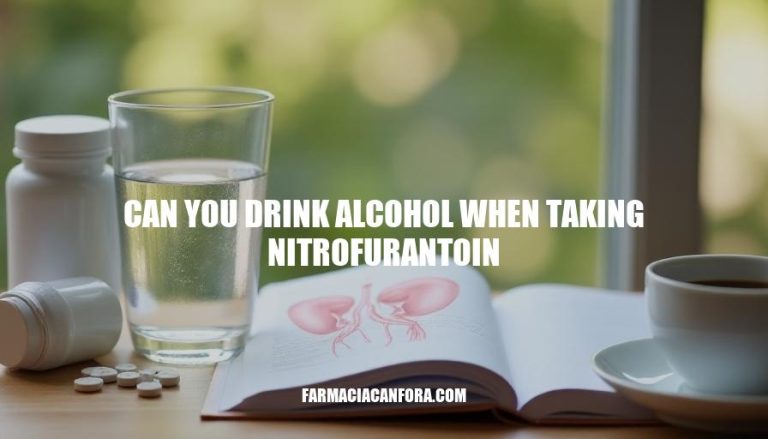


Nitrofurantoin is an antibiotic that helps treat urinary tract infections (UTIs). It stops bacteria from growing in the urinary tract, which makes symptoms better and prevents further problems.
Alcohol consumption can impact the efficacy and side effects of nitrofurantoin, an antibiotic commonly used to treat urinary tract infections (UTIs). While alcohol does not directly interact with nitrofurantoin, it can exacerbate side effects and potentially reduce the medication’s effectiveness.
Potential Risks and Reactions:
Reduced Effectiveness: Alcohol can impair the body’s ability to metabolize and eliminate medications, including nitrofurantoin. This can lead to reduced effectiveness of the antibiotic in treating the infection.
Increased Side Effects: Nitrofurantoin can cause side effects such as nausea, vomiting, dizziness, and headache.
Consuming alcohol while taking this medication can intensify these side effects.
Liver Strain: Both nitrofurantoin and alcohol are metabolized by the liver. Consuming alcohol while taking nitrofurantoin can put additional strain on the liver, potentially leading to liver damage or other liver-related issues.
Bladder and Urinary Tract Irritation: Alcohol can irritate the bladder and urinary tract, which can worsen UTI symptoms and slow down the healing process.
Key Point: It is generally advised to avoid drinking alcohol while taking nitrofurantoin to prevent potential interactions and side effects. If you have any concerns or specific questions, it is best to consult with your healthcare provider for personalized advice.
Can you drink alcohol when taking nitrofurantoin?
The answer is no, it is best to avoid alcohol to ensure the medication works effectively and to minimize side effects.
Nitrofurantoin, an antibiotic used to treat urinary tract infections (UTIs), can be impacted by alcohol consumption.
While alcohol does not directly interact with the medication, it can exacerbate side effects and potentially reduce its effectiveness. Potential risks include reduced efficacy, increased side effects such as nausea and dizziness, liver strain, and bladder and urinary tract irritation.
It is generally advised to avoid drinking alcohol while taking nitrofurantoin to prevent potential interactions and side effects.
The final verdict is that it is best to avoid alcohol when taking this medication. If you have any concerns or specific questions, it is recommended to consult with your healthcare provider for personalized advice on managing the use of nitrofurantoin and alcohol consumption.